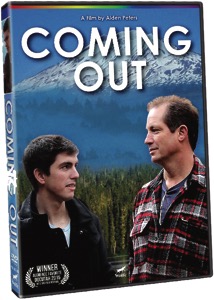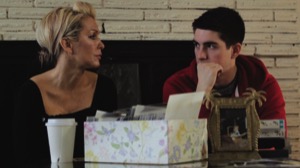
The first thing I did after finishing Alden Peters’ documentary Coming Out was to Google the term ‘coming out.’ It wasn’t that I couldn’t define it for myself but that I couldn’t define it for others. And that was when it occurred to me: the question was also a significant part of the answer. It’s a singular experience, coming out, that is neither fleeting nor trivial, but a significant and ongoing process – defined as a journey by some – that shapes the person you will become.
Alden Peters, a young, clearly gifted documentarian, makes that singular experience accessible by documenting the reactions of his friends and family as he comes out to them; he starts with his brother, graduates to his friends, other siblings and finally his mother (who remarried) and his father. And it’s compelling theater. The reactions, the ability to watch what it is like to come out (however biased toward acceptance his friends and family may already be) will help a lot of young people in a way that has rarely been accessible before.
What distinguishes Peters is the degree to which he recognizes historical forces (the usefulness and ubiquity of video) while humanizing the most salacious elements of these forces with his keen eye. He revisits the bridge where Tyler Clementi, a gay college freshman from Rutgers, ended his life then cuts to the threatening waters below where that same young man felt he deserved to be. “The shot of the water and also the typing of the forum post are two moments where the audience is really looking through my eyes.”

And it’s compelling when two young men come out, one to his father, the other to his mother, on video. It’s nearly impossible not to cry watching the raw intimacy of two young gay teenagers crying because their parents tell them they still love them regardless, as the gut punch of having to question your parents’ love is even a question for the majority of their straight peers.
I was lucky enough to catch Alden’s attention for a bit and asked him a few questions about his filmmaking style, his methods of communication and his connection to humanity.
San Diego LGBT Weekly: What is your primary job as a documentarian when the subject is you?

Alden Peters: My primary job is always to tell an emotionally honest story. Because I was also the subject that required a lot of delegation. You might not guess it because I made a feature documentary about myself, but I’m actually a very shy, private person. For me to be emotionally honest, and to be open and vulnerable, was a significant personal task. Co-producer Brenda Lopez was instrumental to the production process because she was the one I let take the filmmaker burden while I was on camera. That let me be myself and let me be open. We agreed that I would not censor myself about anything while we were filming. No subject or topic was off the table because we could decide what I share and don’t share in the edit room. It was also my job as a documentarian to trust my editors, Megan Mancini and Alex Familian. Because I was inherently less objective than them about myself on camera, I listened to them when they disagreed with me and when they advocated for a different direction to a scene. I very rarely vetoed any of their decisions because when I did (usually because I was cringing at what I was saying) I was wrong.
There was a brief glimpse of the reaction you got on Facebook after coming out. I suspect most of it was very supportive. Were there any unsupportive comments, especially from someone you may have known?
All of the direct messages to coming out were positive. Lots of likes and congratulations. Unsupportive comments and blatant homophobia was certainly on Facebook, posted by people I knew, but it was never targeted specifically toward me. It was a lot of posts against marriage equality. A friend who was close when we were young posted that he wanted to vomit on the capitol building of Washington State because marriage equality had just passed. There was a long, long chain of comments about how disgusting gays were.

When you came out to your friends in New York City, they seemed phased but not rendered immobile by the fact that you were filming them. Had you filmed your friends before? What was their initial reaction or were we seeing this for the first time?
What you see on camera is everyone’s first response to me coming out to them. My friends and I have always been making videos together – all the footage of us in middle and high school was outtakes of the videos we were making, either for school projects or for fun. The documentary style of filming was newer to them than to my family who always has a camera around during holidays and vacations. During their trip to New York City when I told them, I filmed them for an entire week before finally coming out to them so that they would be as comfortable as possible with the camera.
One of the conclusions I took away from Coming Out was parents will surprise you. What do you tell the teen whose parents don’t support their coming out?

A friend of mine has parents who to this day don’t support his coming out. He’s had to come out multiple times to them. His perspective really struck me, though. He said it took him so many years to accept himself, how can he expect his parents to accept him so quickly? They, like him, need time. I don’t think “just wait” is a good piece of advice to give, but my friend’s patience with his parents is admirable. If your parents aren’t supportive of you, you have a family in the LGBTQ community. Even if your parents are supportive of you, you also have a family in the community.
The shot of the Hudson River at the beginning of the film was magnificent. Sure, it was symbolic, but it was also a glimpse of how the director sees the world. What inspired you to include it?
I see the world empathetically. It’s partially why I am so drawn to documentary filmmaking; I enjoy hearing people share their stories and putting myself in their shoes. That’s always why the string of LGBT youth suicides in the media in September 2010 were so impactful, and why Tyler Clementi’s story was especially arresting. I saw myself in those headlines. I could see myself in their situation. So, when standing on the George Washington Bridge looking down into the water, I took the camera from the cinematographer and filmed the shot looking down into the murky river. My whole motivation for the film was to create an experiential journey that places the viewer directly into each moment. The shot of the water and also the typing of the forum post are two moments where the audience is really looking through my eyes.

How did you fund Coming Out?
Coming Out was mainly crowdfunded. We had successful Indiegogo and Kickstarter campaigns and we received direct donations through our fiscal sponsor, IFP. We were also the grantee of the Alan Landsburg Documentary Fund.
We often say ‘coming out’ is a personal decision and we try to respect a person’s right to tell us who or what they are in their own time. Yet, you filmed the people closest to you in a very public way. How did you square that in your own mind about not giving others the opportunity to sign off on reacting to such a confession on film?
It was something I thought about very often. How do I film these reactions and get an authentic reaction without people being affected by the camera as much as possible? How do I ensure I’m not exploiting people’s reactions? Me and the team had long conversations about this. I had a conversation with everyone who’s in the film about their participation, and their representation, to make sure they are OK with how they come across. There are others who were very, very close to me at the time who wanted zero part in the film. They chose not to be in the film, didn’t sign a release, and asked not to be included. They didn’t want their stories to be told within the context of this film and didn’t want their reaction locked in time. This is one of the reasons why the film is so uplifting and positive: those that reacted well chose to be in the film.
Coming Out was released Oct. 4 by Wolfe Video in celebration of National Coming Out Day which was Oct. 11. For more information on the film and to view the trailer visit: wolfevideo.com/products/coming-out/











